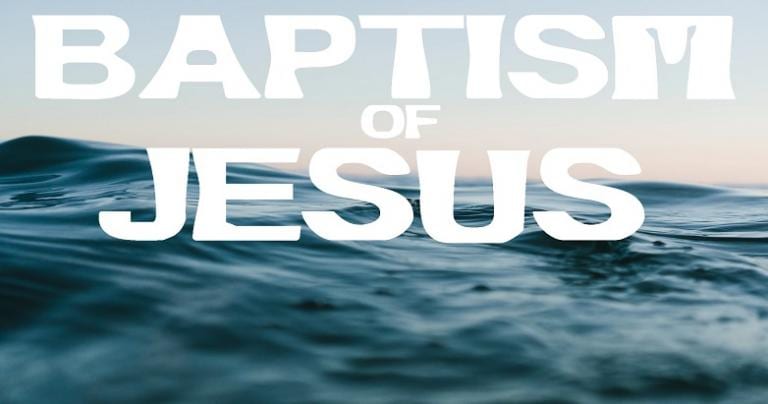
Baptism, when it comes to Jesus’ own, was both revelation and discovery of his identity.
Baptism and Jesus, the subject of last Sunday’s Gospel from our Common Lectionary. Did John really baptize the historical Jesus? And how would we know for sure?
When it comes to historical research, high probability equals moral certainty. Historical scholars have developed and use various criteria for determining what materials in the Gospels conform to the historical situation of Jesus. These would be features of the Gospels that were not invented by the later Jesus groups—they actually happened. When multiple criteria working in concert confirm something historical fact about Jesus, we derive the highest probability and moral certainty that it did, in fact, happen.
We can therefore be morally certain of several realities concerning Jesus. Among them: it is highly probable that Jesus actually existed and lived. That this very real and historical Jesus was crucified by imperial cruelty and proclaimed risen by his peasant followers shortly after comprise the most certain things we can know of him. We can be morally certain that he was a Galilean peasant turned folk healer. Other facts about Jesus we know include his embarrassing origins with uncertainty concerning the identity of his biological father. In a future post we can look at facts about Jesus and how we determine them.
Baptism of Jesus—It Happened
One of the most certain historical facts recorded in the Gospels is that the prophet John, called “Baptist,” baptized Jesus. This event, the subject of this past Sunday’s Gospel in the Common Lectionary, was too embarrassing for the early Jesus groups to invent. We will see why momentarily. All of the Gospels speak about it. But all have their own spin on this event, each showcasing a different interpretation of it.
The Right Season for Baptism
Given what we know of the two seasons experienced in the Levant, scholars claim to know when John dunked Jesus. It is highly probable that this happened at the start of the dry season (lasting from early May until early September). In the rainy season (late September until late April), Israelites mostly stayed in their homes. But Mediterraneans need to be seen by others and to get into everybody’s business. Human life must be therefore visible!
John was dunking many people. This tells scholars that the dry season had just begun. The Jordan and its streams would be swollen with water. Due to the sun, the temperature of this shallow, living (i.e., moving) water would not be uncomfortably cold.
Despite trying to make improvements, “Matthew” follows “Mark” pretty close. Therefore in the Gospel called “Matthew,” the ministry of Jesus is only one dry season long. The Synoptics disagree with “John” where the Jesus Movement lasts three dry seasons. In all Gospel accounts, Jesus dies crucified at Passover-time, the beginning of the dry season and a harvest feast.
Jesus’ Baptism Meant Social Death
For the Nazarene Jesus to go seek out the prophet John for dunking meant leaving his family and village life, his identity. This was a kind of death—Jesus died to his Nazareth Group-self and joined to a new Group-self, that of the faction of John the Dunker. This movement of Jesus is deeply meaningful, but Western individualists are remote from social systems of first century Israel. We have to grapple with this story to see what it meant to say.
The ancient Mediterranean world—the cultural world of the Bible—knew of only two central social institutions: kinship and politics. In the Bible there can be no meaningful existence or identity for individuals apart from family, whether biological or fictive (e.g., political faction).
Unlike the later Synoptic Gospels called “Matthew” and “Luke,” “Mark” lacks both an infancy narrative and a genealogy of Jesus. But very much like “Matthew” (see 1:8ff), the document called “Mark” begins his Gospel as a horror story. The Baptism of Jesus in “Mark” (see 1:9-11) is like the unpleasant earliest Christmas story of Matthew 1—2—a tale of terror. Mediterranean audiences, Middle Eastern listeners, would get the horror we American Christians do not—to break with family ties means Jesus is a dead man! Worse!—he’s a dead man unremembered, without burial with his family and village!
What can the vagabond Jesus do now? This is shameful! Disgraceful! He is lost! In the collectivistic, Mediterranean world of the Bible, one simply cannot be without being embedded in some family group.
Baptism and the Sky Voice
The horrific predicament of Jesus finds resolution from a thunderous voice from the sky vault. While being dunked into the Jordan by the prophet John, the Gospel accounts explain that the Voice declares Jesus to be son of God, attached to and highly pleasing to the patron God of Israel. This confirmed to Jesus, John, and any witnesses who Jesus was—beloved and pleasing son, client to the Patron God of Israel, and broker between Patron and other client-Israelites.
Did the ancient world understand sexual reproduction? No. Could anyone back then prove who the actual father of a child someone was? It was impossible for our ancestors in faith. So when does a boy or girl become a son or daughter in the world of the Bible? It can only be when a father publicly acknowledges that person as his own.
Recall the Matthean Infancy Narrative (Matthew 1—2). When, according to that story, Joseph agreed to take Mary into his (father’s) household, he was declaring to the village Jesus was his. Recall what we learned here. Yes Mary was not pregnant by him. Yes they lied by doing this, and no, it fooled no one present, because all knew Mary was pregnant early. Nevertheless, Joseph publicly declared Jesus as his own issue and Jesus instantly became a son, embedded into Joseph and Joseph’s father, embedded into the village-self. Immediately Jesus received honorable status and a secure and relatively safe identity-container in which to grow.
What the Sky Voice Does
By Matthew 3:13-17, that’s all done and gone. Jesus has symbolically broken ties leaving his group-self—his identity!—behind him. It’s like diving into oblivion. But on that precipice, the God of Israel publicly declares (by way of an altered state of consciousness experience) Jesus as the honorable son. With that public honor declaration and acknowledgment, it is possible for the artisan Jesus to begin his political movement, form a political faction, and begin shamanic healings.
Whew! That was close. Okay. Mediterraneans can keep reading or listening to the story. Remember no one from the United States was involved in the production or composition of the Scriptures. Therefore there are no American social values in our sacred library. Rest assured, the Bible was not written by, for, or about Americans, Christians or otherwise.
Honor of the Baptism
Considering Mediterranean audiences with Mediterranean social values, one thing we cannot afford to let slip by is a proper understanding of honor. Honor was the key social value in that cultural world of our Mediterranean Scriptures. Honor means a public proclamation of worth accompanied by a public acknowledgement of that worth.
The declaration the Voice makes from sky vault established Jesus’ honor-rating. Both “Mark” and “Matthew” tell us of the torn-open Sky Vault. This indicates the public nature of this event. If Jesus had only experienced a personal altered state of consciousness, rather than a group-shared experience, then it would be considered meaningless by his collectivistic society. This dunking of Jesus is a public event witnessed by all present. Here God personally proclaims his relationship to Jesus—father to son, patron to client (and broker to other clients). Jesus never would be able to begin his ministry without this public acknowledgment.
But the texts leave us speculating, because, even though it happens publicly, they don’t specify who heard this message from the sky, much less understood it properly. The text does not say who publicly acknowledged this honor claim for Jesus.
Following the Baptism in “Mark”
The author we call “Mark” expects his audience to recognize Jesus as the pleasing Son of God, the authentic broker between the Patron-God and client-Israel. Hearers and readers of the Gospel called “Mark” were expected to recognize God as the source of Jesus’ honor and affirm it.
Galilean Nazareth was a tiny peasant hamlet, a nothing-place lived in by nothing-people. For a village artisan to act as a public figure was deemed completely illegitimate. And there was a memory that Jesus’ home village remained skeptical (Mark 6:2-3; Matthew 13:54-58). But who would dare contest the legitimacy of the son of God as a public figure? We 21st century Western Christians must realize that for our ancient Mediterranean ancestors in the faith, who Jesus truly was bore immense importance.
Baptism Embarrassment
Earlier we stated that from the very first Jesus groups there was a deep embarrassment that Jesus submitted to the dunking administered by John. Hadn’t John explained that his dunking was all about repentance (Matthew 3:11)? Wasn’t Jesus superior to John the Dunker (Matthew 3:11-12)? If so, why would Jesus need to repent? Also—gasp!—why did Jesus seek out John in the first place? Was he at one point John’s disciple?
Scholars like John Pilch explain that decades after, Messianist authors like “Matthew” grappled with these painfully embarrassing historical memories. Pilch says “Matthew” came up with two explanations. Let’s examine each.
Pilch says the first explanation given by “Matthew” is found in all three Synoptic Gospels—the voice from sky vault. This thunderous “echo” of something God said above the sky vaults got used a lot in contemporaneous Israelite literature at the time (e.g., the Aramaic Targums). It was employed as a way of explaining questionable events such as Abraham trying to murder his son (Genesis 22:10) and why angels descend instead of ascend (Genesis 28:12). Here the Voice says Jesus’ dunking was God’s will (Matthew 3:17F). Jesus pleases God by his obedience, and Pilch says this suggested that Jesus, in turn, deserves obedience from his followers.
“Fulfill All Righteousness”
Pilch tells us the second explanation of “Matthew” is unique to his Gospel. It is the Matthean Jesus’ claim that he has to “fulfill all righteousness.” According to Pilch, scholars understand by this that, like many of his fellow Israelites, Jesus got intrigued by the reputation of John the Dunker. Curious, he went out to encounter the prophet (only “Luke” claims they were cousins, probably his invention). But when fiery John exhorted his listeners to metanoia, this caused a fascinated and impressionable Jesus to have a change of heart.
Yes, Jesus is human, folks. Precisely because he was the Divine Word he is the most human being who ever lived. Let’s come out from the closet of Docetism and into Christianity, if only for a moment.
How could sinless Jesus have a conversion experience? Because he was human. Take the prefix “in” of incarnation seriously. Jesus was an artisan, not unlike a construction worker. We have no evidence that he cheated his clients. But there were no perfect scales in his day. His work carried risks and Jesus must have recognized this. Had he, perhaps accidentally, not exchanged fairly in his interactions and work? And the bastard-status would not have been far from Jesus his whole life. Maybe the prophet John could help him.
Pilch says the historical Jesus probably accepted John’s exhortation to “produce good fruits.” So the historical Jesus got dipped by the Dunker (“Baptist”) because he sought to please the God of Israel. Because of this, Pilch says, the historical Jesus became the disciple of John for some time. Up until John was arrested, he probably shared in the dipping movement and was part of the group-self of John’s coalition. Note that in John 3:22 Jesus’ own dunking ministry is reported. Contrast that to John 4:1-2, the later embarrassed Messianist tradition, which denies it all.
Baptism and Being Human
To be human means one must discover one’s own identity and discern the will of God for oneself and work out one’s destiny. Jesus, the human being fully alive precisely because he is God the Son, was no different. His culturally informed, messy beliefs helped him in this human quest.
To hell with Docetism masquerading as orthodoxy.












